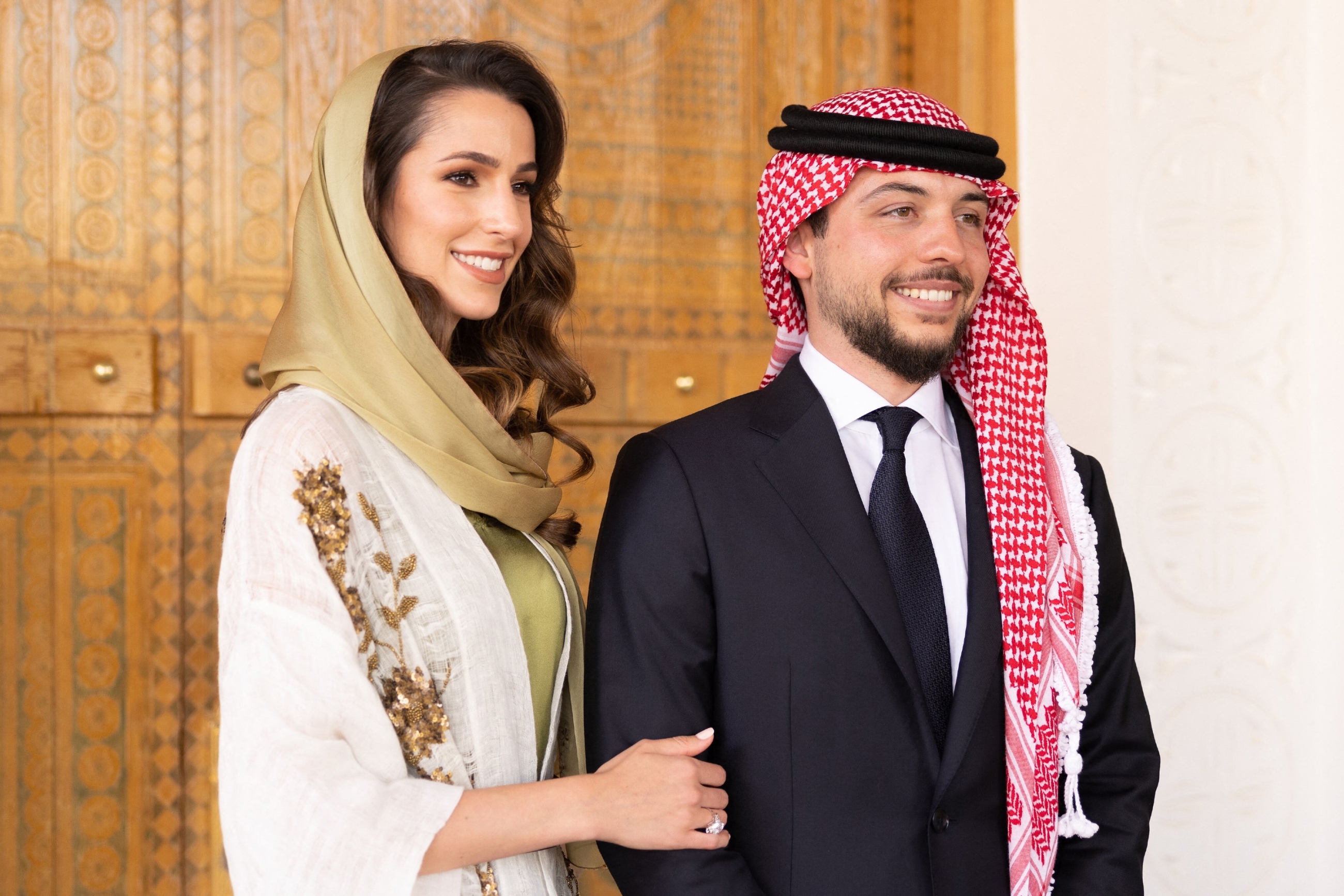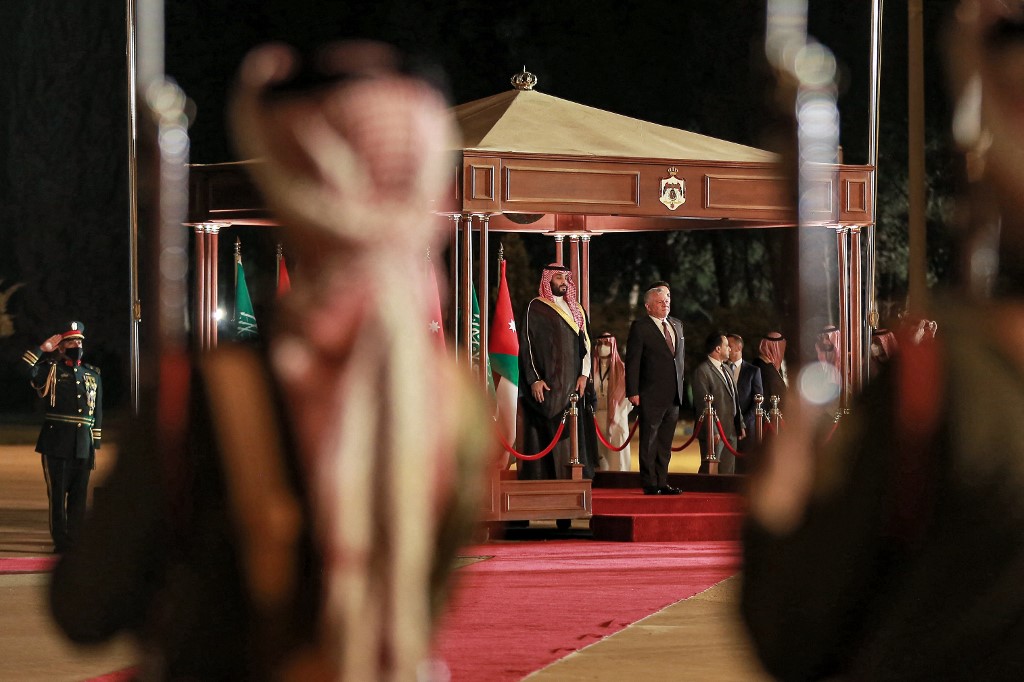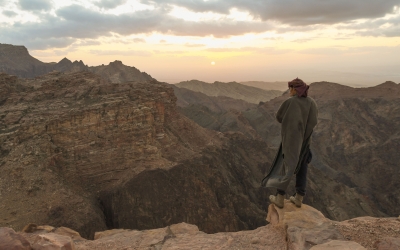A royal wedding paves way for cautious Saudi-Jordanian rapprochement

The engagement of Jordan's Crown Prince Hussein to Saudi Arabian Rajwa al-Saif can help cool tensions between the neighbouring kingdoms, analysts have said, but it's unlikely to reconcile differences.
The engagement ceremony took place at Saif's home in Riyad, in the presence of several members of the bride-to-be's family, as well as Jordan's King Abdullah II, Queen Rania and other Jordanian royals.
'The days will show us if there are results, but initially, a marriage of this kind will have an impact on strengthening relations'
- Khaled Shneikat, analyst
Saif, 28, could become Jordan's first queen of Saudi descent. She was born and raised in Riyadh and received her higher education at the College of Architecture at Syracuse University in New York, according to Jordanian local news. Crown Prince Hussein, who is also 28, studied at Georgetown University in Washington DC.
Following the engagement announcement, Saudi Arabia's Crown Prince Mohammed bin Salman called his Jordanian counterpart to congratulate the couple and wish them success and a happy life, Saudi state media reported.
The royal engagement comes amid a thaw in Saudi-Jordan relations, after years of tension due largely to divergent views on regional conflicts, struggles over Jordanian custodianship of Jerusalem's holy sites and alleged Saudi links to a coup attempt that almost destabilised Jordan last year.
Stay informed with MEE's newsletters
Sign up to get the latest alerts, insights and analysis, starting with Turkey Unpacked
Prior to this year's July Jeddah Summit, King Abdullah, accompanied by Crown Prince Hussein, had only made one official visit to Saudi Arabia in 2021, since his last visit in October 2019.
A month before the summit, Mohammed bin Salman visited Jordan for the first time in over five years, where he expressed keenness to strengthen relations. King Abdullah bestowed the Saudi crown prince with a medal to highlight the two kingdoms' "deep-rooted" ties, according to Jordanian state media.
The Jordanian crown prince's engagement to Saif provides a "new impetus" for Jordan-Saudi relations to continue to grow, Khaled Shneikat, head of the Jordanian Political Science Society, told MEE.
"The [next] days will show us if there are results; but initially, a marriage of this kind will have an impact on strengthening relations between the two countries and increased rapprochement," Shneiket stated.
Coup plot
Ties between Saudi Arabia and Jordan, historically close allies, slumped during former US President Donald Trump's term in office, when Riyadh's close relations with Washington were viewed as undermining Jordan's role in the region.
Relations reached a low point in April 2021, when Jordanian authorities uncovered an alleged coup plot led by Prince Hamzah bin Hussein, the half-brother of King Abdullah and former crown prince. Large-scale arrests ensued, with police detaining Bassem Awadallah, the former head of Jordan's Royal Court and a consultant adviser to Saudi Arabia's Mohammed bin Salman.
A source close to the investigations told Middle East Eye at the time that Awadallah was arrested after Jordan’s intelligence services intercepted and deciphered encrypted voice and text messages between him and MBS.
The two men discussed how and when to use mounting popular unrest in Jordan, stoked by the kingdom’s flagging economy and the Covid-19 pandemic, to destabilise the rule of King Abdullah.
'I believe that King Abdullah does not like Mohammed bin Salman and vice versa'
- Analyst
Saudi Arabia denied any links to the kingdom and went as far as sending an official delegation to Amman to dispel the reports.
"I have no doubt that the Saudis wanted to destabilise the kingdom... since they were fed, by Awadallah, secret information about the king and his opinion regarding Mohammed bin Salman," an analyst, who preferred to remain anonymous, told MEE. "I believe that King Abdullah does not like Mohammed bin Salman and vice versa.
"The engagement could play a role in calming the relationship to some degree and it could change the attitudes of Mohammed bin Salman towards the royal family in Jordan."
Cautious rapprochement
The crisis has supposedly waned since, and the two neighbours have embarked on a rapprochement in recent months.
Jordan needs strategic relations with the oil-rich Saudi kingdom for economic and security cooperation, now increasingly important as the country grapples with inflation and widespread unemployment, and to counter Iranian proxies allegedly involved in the drug trade on Jordan's Syrian border, according to Raed Omari, a political analyst and veteran journalist.
"The prince's marriage to a Saudi national will have immense contributions towards enhancing [Jordan-Saudi] relations," Omari told MEE.
The Saudis are Jordan's largest investors, with $14bn worth of investments through around 900 projects across the country, according to a report from the Saudi Press Agency, issued during MBS's June visit to Jordan.
There are around 430,000 Jordanians working in Saudi Arabia, who send millions of dollars in remittances back home, according to official figures. In the first four months of 2022, funds transferred to Amman reached $1.1bn, marking a 1.5 percent rise from the same period last year.
'Saudi Arabia has formed an economic safeguard for Jordanians, especially for those who work there'
- Badir Madi, political science professor
"Saudi Arabia has formed an economic safeguard for Jordanians, especially for those who work there," said Badir Madi, a professor of political science at German Jordanian University (GJU).
"The [crown prince's] engagement has been welcomed by the majority of the people," Madi told MEE. "Jordanians need good relations with Saudi Arabia."
A public opinion poll last May found that Jordanians viewed Saudi Arabia as the Arab country "most supportive" of Jordan and the country Jordanians would most prefer to cooperate with, if given the option.
Cooperation with Saudi Arabia is "obligatory", said political analyst Amer Sabaileh. "This is what geography says; this is what history says. The south of Jordan, socially and culturally, is very similar to the Saudi lifestyle… Jordan and Saudi Arabia cannot be rivals."
Arab queen
The Jordanian crown prince's engagement came a month after the engagement of his sister, Princess Iman, to the Venezuelan-born businessman Jameel "Jimmy" Alexander Thermiotis, who is of Greek descent.
Princess Iman's engagement – she is the first of King Abdullah's four children to get engaged – was met with disapproval by many Jordanians, Thermiotis is not Arab and supposedly not Muslim. Marriage to non-Jordanians within the royal family is frowned upon by some in the country.
Queen Rania, King Abdullah's wife, has been a frequent target of criticism domestically, with many pointing to her Palestinian origins as the source of their disapproval.
Princess Iman's engagement was "actually really surprising and made the people mad, to some degree", said a Jordanian, who preferred to remain anonymous. However, he added that Prince Hussein's recent engagement "calmed down the people of Jordan; we were so happy to see he was not following in the steps of his sister".
The Hashemites trace their lineage directly to Prophet Muhammad, which is essential to the royal family's legitimacy as rulers of Jordan.
Madi said, "They [Jordanians] are really happy to see the prince engaged to an Arab-Muslim girl, a girl with tribal roots from Arabia. Absolutely, it will send a good message to Jordanians."
The origin of the family of Prince Hussein's fiancee goes back to the Subai tribe, who have been sheikhs of the town of Al-Attar in Sudair, Najd, a historical region in central Saudi Arabia, since the reign of Saudi Arabia's first king, King Abdulaziz Al Saud, Jordanian local media reported.
The Sudair area was also the home to Hussa Al Sudairi, one of the wives of King Abdulaziz, and mother to the "Sudairi Seven" – a powerful alliance of seven sons of Abdulaziz, including former King Fahd and current monarch Salman.
Jordanians and Saudis share many common values and traditions "in almost everything", Shneiket noted, pointing specifically to both kingdoms' "conservative societies", which he said is reflected in how the bride-to-be dresses.
"Jordanian people, they are so happy to see her modesty; they are really happy to see that this upcoming queen is similar to them," Madi added. "The recent engagement was so good for the prince and for the royal family."
'Coming phase'
Prince Hussein's engagement is a "preparation for a coming phase – an image of a prince with a princess, a future queen", Sabaileh said, also noting the crown prince's increased involvement in domestic and foreign affairs. Madi said the engagement will be reflected in a "better relationship between both sides" in the coming period.
But Sabaileh stressed that, right now, the engagement does not have any "real political meaning" and cannot be seen as a "real rapprochement" between the kingdoms. The engagement "obviously wants to show that there is no problem between the two countries", he said, but "Jordan and Saudi Arabia still do not enjoy strategic relations".
'Jordan and Saudi Arabia still do not enjoy strategic relations'
- Amer Sabaileh, political analyst
Given MBS's ambitious modernisation plans and renewed regional vigour, including seemingly cooperative steps with Israel, Sabaileh pointed out that Jordan now faces a "totally different Saudi structure than the historic structure Jordan used to deal with".
This has left Jordan behind, preoccupied with its domestic troubles, just "serving the Saudi vision", rather than having a strategic alliance, Sabaileh said.
"Jordan needs to think seriously about how to improve its diplomatic and political skills to always be part of this developing region, or your partners will never find you as a strategic partner," he added.
Madi pinned hope on a "future alignment between our prince and Mohammed bin Salman. The engagement will be really opening for the relationship between the two leaders and two peoples [of Saudi Arabia and Jordan]".
"Our prince and MBS will have a lot in common in the future," he added.
This article is available in French on Middle East Eye French edition.
Middle East Eye delivers independent and unrivalled coverage and analysis of the Middle East, North Africa and beyond. To learn more about republishing this content and the associated fees, please fill out this form. More about MEE can be found here.






